Collective nouns are one of the essential parts of the English Language. Collective nouns are part of various languages and are integral to linguistics. There is virtually no language that does not use Collective nouns in some capacity.
What are collective nouns?
Collective nouns refer to words used to denote a group of people, animals, or things. A collective noun is one word that represents a group of animals, people, or things. The main objective of using collective nouns is to simplify communication and description.
| Form | Definition |
| Collective Noun | n linguistics, a collective noun is a word referring to a collection of things taken as a whole. Most collective nouns in everyday speech are not specific to one kind of thing. For example, the collective noun “group” can be applied to people, or dogs, or objects. (Wikipedia) |
By reading or hearing the collective noun, the reader or listener would understand that the speaker is referring to many individual entities of a kind. By mentioning the collective noun, the need to describe the amount or an exact number of ordinary things/people/or animals are removed.
| People | Animals | Things |
| A band of men | A colony of gulls | A bottle of milk |
| A cast of actors | A brood of hens | A box of cereal |
| A stack of librarians | A flock of turkeys | A can of soda |
Examples of collective nouns
There are hundreds of collective nouns in the English Language. Some of the most commonly used collective nouns are:
- A herd of elephants
- A team of players
- A band of musicians
- A group of dancers
- A choir of Singers
- A basket of fruits
- A bowl of rice
- A tribe of natives
- A string of Pearls
- A galaxy of stars
- A staff of employees
- A chest of drawers
- A zoo of wild animals
- A fleet of cars
Learn in a short video lesson
What are collective singular nouns?
Collective nouns, in general, always take a singular form. This means that a verb follows them in the singular form.
However, in some cases, collective nouns may take a plural form and thus get followed by a plural verb form.
This occurs when every single entity in the group acts as an individual rather than acting collectively.
Let’s look at some examples to understand this further:
- The family is going on vacation (Collective Singular Noun)
- The family are planning to take a vacation together (Plural verb form)
- A pack of wolves was hunting the Deer. (Collective Singular Noun)
- A pack of wolves were hunting for the Deer (Plural Verb Form)
- A litter of kittens was born earlier today. (Collective singular Noun)
- A litter of kittens have been running wild since morning (Plural verb form)
- A band of musicians is scheduled to perform today (Collective Singular Noun)
- A band of musicians have been causing a ruckus since last night (Plural verb form)
Common collective nouns used for people
There are several of collective nouns specifically created to represent a group of people.
The various collective nouns for people also refer to people from different walks of life. For instance, specific collective nouns are used for musicians, policemen, men, women, etc.
Let’s look at a list of all the collective nouns used for people:
- A bevy of ladies
- A crew of sailors
- A body of men
- A dynasty of kings
- A crowd of people
- A slew of rioters
- A couple of people
- A group of dancers
- A slew of prisoners
- A slew of hooligans
- A line of kings
- A posse of policemen
- A patrol of policemen
- A troupe of artists
- A class of students
- A board of directors
- A company of actors
- A caravan of gypsies
- A regiment of soldiers
- A band of musicians
- A troop of scouts
- A tribe of natives
- A pack of thieves
- A party of friends
- A group of friends
- A staff of employees
- A bunch of crooks
- A choir of singers
- A horde of savages
- A host of angels
- An illusion of magicians
- A staff of officials
- A squad of soldiers
- A squad of detectives
- A bench of magistrates
- A conference of delegates
Common collective nouns used for animals
The animal kingdom is enormous, and so is the list of collective nouns used to represent a group of animals. There are specific collective nouns that are used for specific animals.
For instance, there are specific collective nouns for birds, lizards, monkeys, elephants, crocodiles, etc. Even for the same animal, just as there are different species, there are different collective nouns for each species.
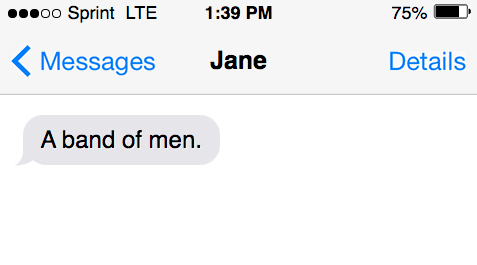
For example, there are specific collective nouns for crows, flamingos, pigeons, etc. Similarly, there are specific collective nouns for chimpanzees, baboons, etc. This is how every species of animal can have different collective nouns.
Some of the most common collective nouns for animals are:
- A stare of Owls
- A mess of Iguanas
- A bask of Crocodiles
- A flight of Dragons
- A herd of Dinosaurs
- A knot of toads
- An army of Frogs
- A culture of Bacteria
- A rhumba of Rattlesnakes
- A nest of Vipers
- A bury of Rabbits
- A drove of Rabbits
- A pride of Lions
- A skulk of Foxes
- A lead of Foxes
- A drift of Foxes
- A stand of Flamingos
- A sloth of bears
- A plump of geese
- A wedge of geese
- A flock of pigeons
- A prickle of Hedgehogs
- A blessing of Unicorns
- A Whoop of Gorillas
- A span of mules
- A pack of Mules
- A Chine of Polecats
- A clan of Hyenas
- A cat of Ferrets
- A colony of Badgers
- A couple of Impalas
- A destruction of Wildcats
- A pack of Mongooses
- A litter of piglets
- A fall of lambs
- A herd of Swine
- A husk of Jackrabbits
- A horde of Gerbils
- A herd of of Chamois
- A herd of Wildebeests
- A herd of Yak
- A herd of Harts
- A herd of Ibexis
- A mob of Wombats
- A mob of Kangaroos
- A park of Greyhound
- A parcel of Hinds
Examples for birds
Birds are of various types. Every single species of bird has one or more collective nouns used to refer to that particular species alone. There are thus a lot of collective nouns dedicated to birds.
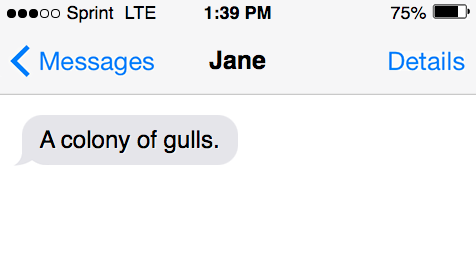
Some of the most common examples of collective nouns used for birds are:
- A Flock of Birds
- A Flight of Birds
- A Dole of Doves
- A Muster of Peacocks
- A Huddle of Penguins
- A Host of Sparrows
- A rafter of Turkeys
- A covey of Quails
- A bellowing of Bullfinches
- A cadge of Peregrines
- A Fling of Dunlins
- A flush of Ducks
- A desert of lapwings
- A fling of Sandpipers
- A Parliament of Owls
- A Brood of Chickens
- A Scold of Jays
- A Volery of Birds
- A Nest of Birds
- A cast of Facons
- A brood of Hens
- A colony of Gulls
- A colony of Vultures
- A gaggle of Geese
- A company of Parrots
- A pride of Ostriches
- A mews of Hawks
- A pod of Pelicans
Examples for bees
While there are a lot of species of Bees, the collective nouns used to refer to them are common and general.
The most common collective nouns used to represent a group of bees are:
- A Colony of Bees
- A Drift of Bees
- A Swarm of Bees
- A Hive of Bees
- A Nest of Bees
- A Rabble of Bees
- A Stand of Bees
- An Erst of Bees
- A Grist of Bees
Examples for bats
Contrary to popular belief, bats are not birds. These are mammals and are classified as animals. There are a lot of collective nouns used to refer to a bunch of bats.
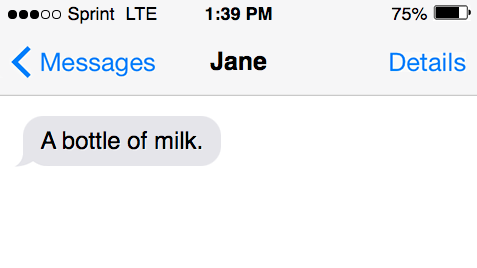
Some of the most common collective nouns for bats are:
- A colony of Bats
- A cloud of Bats
- A flock of Bats
- A camp of Bats
- A Cauldron of Bats
Examples for cats
Cats are among the most beloved domesticated pets. However, they come from a rather dangerous family. There are also wild cats quite commonly found in some parts of the world.
Here is a list of all the collective nouns used to represent a group of cats of various types:
- A Clowder of Cats
- A Glaring of Cats
- A pounce of cats
- A clutter of Cats
- A cluster of Cats
- A litter of Cats
- A nuisance of Cats
- A Kindle of Kittens
- A Destruction of Wild Cats
Examples for baboons
Baboons are a distinctive member of the ape family. These colorful and funny creatures have a lot of collective nouns dedicated to them.
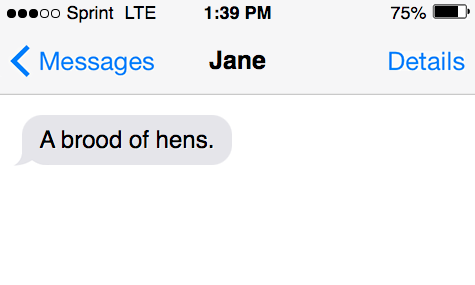
Some of the top collective nouns used to refer to a bunch of Baboons are:
- A troop of Baboons
- A flange of Baboons
- A tribe of Baboons
- A Congress of Baboons
- A Band of Baboons
Examples for crows
Crows are considered the carriers of death. This is even translated into their collective nouns. Some of the most commonly used collective nouns for crows often sound rather dark.
The most widely used collective nouns for crows are as follows:
- A conspiracy of Ravens
- An unkindness of Crows/ Ravens
- A rave of Raven
- A treachery of Raven
Examples for dogs
Dogs are the most common domesticated pets. These furry little friends are known for their cute looks and loyalty toward their owners.
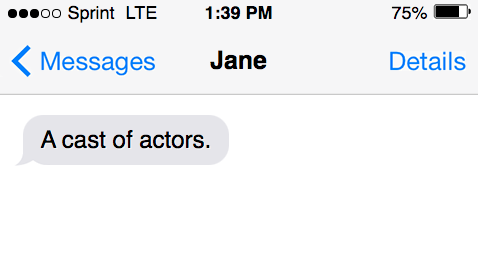
However, there are other species of dogs as well which belong in the wild. For instance, husky Dogs, native to frigid cold temperatures though domesticated, remain largely wild dogs.
Foxes are also part of the dog family but are not domesticated animals.
- A pack of Dogs
- A mute of Dogs
- A Kennel of Dogs
- A litter of Puppies
- A cry of Dogs
- A Cowardice of Dogs
Examples for deers
Deer are known to often move in groups for protection and safety. As such, it comes as no surprise that there are a plethora of collective nouns used to represent a group of deer.
- A regale of Deers
- A herd of Deers
- A bunch of Deers
- A bevy of Deer
- A brace of Deer
- A leash of Deer
- A parcel of Deer
Examples for snakes
Snakes are commonly found in groups and thus, there are a lot of collective nouns used to represent a group of them.
Since there are a lot of species of snakes, there are also a lot of species specific collective nouns for snake:
- A nest of Snakes
- A slither of Snakes
- A ball of Snakes
- A den of Snakes
- A pit of Snakes
- A bed of Snakes
- A knot of Snakes
- A quiver of Cobras
- A tangle of Snakes
Examples for ants
Ants work best when they are in groups. The groups are strong and can move mounds of heavy things by sharing the burden. There are many collective nouns used to refer to a group of ants.
Some of the most commonly used ones include:
- An army of Ants
- A swarm of Ants
- A bike of Ants
- A colony of Ants
- A nest of Ants
Funny examples of collective nouns
Some collective nouns are downright ridiculous. They are incredibly funny and something unimaginable. Some of them also have a dark tone to them.
Some of these hilarious collective nouns are as follows:
- A Fall of woodcocks
- A family of Sardines
- A nest of Rumors
- A gang of Elks
- An Army of Caterpillars
- A Smack of Jellyfish
- A Consortium of Octopuses
- A lounge of Lizards
- A Snuggle of Sloths
- A bale of Turtles
- A Scurry of Squirrels
- A Paddle of Platypus
- A raft of Otters
- A pod of Whales
Collective Noun Animal/Thing/People
- Cluster Coconuts
- Posse Policemen
- Comb Bananas
- Battery Guns
- Chatter Budgerigars
- Team Oxen
- Pack Thieves
- Pod Birds
- Wad Notes
- Rouleau Money
Common collective nouns used for objects and things
Collective nouns are not reserved for living things alone. There are numerous collective nouns for inanimate objects. The purpose of all of these is the same, to make it simpler to refer to a group of things.
The collective nouns for things also vary depending upon the object they are being used.
Some of the most common collective nouns for things and objects are:
- A pair of shoes
- A bale of cotton
- A pair of scissors
- A pack of umbrellas
- A chain of Islands
- An album of songs
- An album of pictures
- A fleet of ships
- A shower of rain
- A series of events
- A bunch of sticks
- A heap of sand
- A handful of coins
- A stack of hay
- A line of cars
- A set of tools
- A bunch of exercises
- A cellar of wine
- A box of matches
- A box of cigarettes
- A cluster of stars
- A box of cereal
Example for trees
- An Avenue of trees
- A bush of trees
- A beare of trees
- A clump of trees
- A clearing of trees
- A chaparral of trees
- A coup of trees
- A dell of trees
- A copse of trees
- A grove of trees
- A hagg of trees
- A hangar of trees
- An orchard of trees
- A plantation of trees
- A thicket of trees
- A holt of trees
- A withy of trees
Why are collective nouns important?
Collective nouns play a vital role in linguistics. They represent several things, people, or animals. There cannot be just one thief in a pack of thieves. There have to be multiple thieves in this group.
As established, collective nouns make communicating simpler when talking about a bunch of the same thing.
For instance, a pride of Lions, A pack of Wolves, a bed of Flowers, a thicket of Trees, etc. An important thing to remember is that while a lot of collective nouns can be used for most things (herd, for example), others cannot (bouquet, for instance). It is essential to use correct collective nouns.
FAQs
What are collective noun examples?
- A herd of elephants
- A team of players
- A band of musicians
- A group of dancers
- A choir of Singers
- A basket of fruits
How do singular verbs and singular pronouns work with collective nouns?
If the individuals are acting together (more than one person), treat the collective noun as a singular.
Are collective nouns singular or plural?
Typically, they are plural.
Can a collective noun be a singular collective noun?
Yes, words like “Herd” for example are both singular and plural.
Can collective nouns follow an indefinite article?
Yes, unlike uncountable nouns and countable nouns, they can follow an indefinite article.
More on nouns
More resources about nouns:
- Possessive nouns
- Irregular plural nouns
- Proper nouns
- Concrete nouns
- Collective nouns
- Possessive and plural nouns
Sources
- Animals and English
- List of Collective Nouns-2
- A Compiled list of collective nouns
- 200 examples of Collective Nouns
- List of Collective Nouns-3
- Collective Nouns For Trees
- Animal Group Names
- Names for Groups of Animals
- Collective Nouns
- What is a Collective Noun
Inside this article
Fact checked:
Content is rigorously reviewed by a team of qualified and experienced fact checkers. Fact checkers review articles for factual accuracy, relevance, and timeliness. Learn more.
Core lessons
Glossary
- Abstract Noun
- Accusative Case
- Anecdote
- Antonym
- Active Sentence
- Adverb
- Adjective
- Allegory
- Alliteration
- Adjective Clause
- Adjective Phrase
- Ampersand
- Anastrophe
- Adverbial Clause
- Appositive Phrase
- Clause
- Compound Adjective
- Complex Sentence
- Compound Words
- Compound Predicate
- Common Noun
- Comparative Adjective
- Comparative and Superlative
- Compound Noun
- Compound Subject
- Compound Sentence
- Copular Verb
- Collective Noun
- Colloquialism
- Conciseness
- Consonance
- Conditional
- Concrete Noun
- Conjunction
- Conjugation
- Conditional Sentence
- Comma Splice
- Correlative Conjunction
- Coordinating Conjunction
- Coordinate Adjective
- Cumulative Adjective
- Dative Case
- Determiner
- Declarative Sentence
- Declarative Statement
- Direct Object Pronoun
- Direct Object
- Diction
- Diphthong
- Dangling Modifier
- Demonstrative Pronoun
- Demonstrative Adjective
- Direct Characterization
- Definite Article
- Doublespeak
- False Dilemma Fallacy
- Future Perfect Progressive
- Future Simple
- Future Perfect Continuous
- Future Perfect
- First Conditional
- Irregular Adjective
- Irregular Verb
- Imperative Sentence
- Indefinite Article
- Intransitive Verb
- Introductory Phrase
- Indefinite Pronoun
- Indirect Characterization
- Interrogative Sentence
- Intensive Pronoun
- Inanimate Object
- Indefinite Tense
- Infinitive Phrase
- Interjection
- Intensifier
- Infinitive
- Indicative Mood
- Participle
- Parallelism
- Prepositional Phrase
- Past Simple Tense
- Past Continuous Tense
- Past Perfect Tense
- Past Progressive Tense
- Present Simple Tense
- Present Perfect Tense
- Personal Pronoun
- Personification
- Persuasive Writing
- Parallel Structure
- Phrasal Verb
- Predicate Adjective
- Predicate Nominative
- Phonetic Language
- Plural Noun
- Punctuation
- Punctuation Marks
- Preposition
- Preposition of Place
- Parts of Speech
- Possessive Adjective
- Possessive Determiner
- Possessive Case
- Possessive Noun
- Proper Adjective
- Proper Noun
- Present Participle
- Prefix
- Predicate



